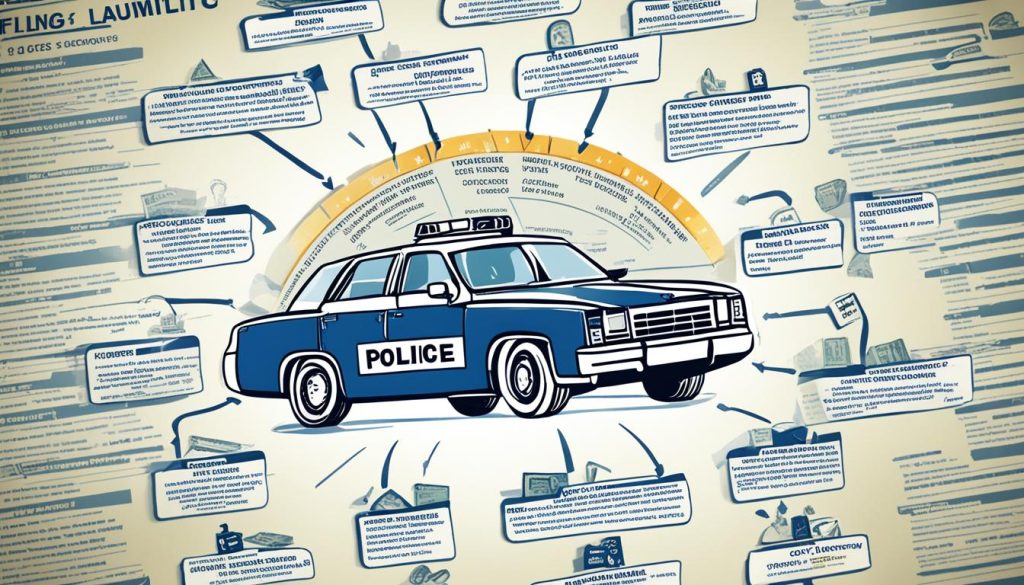Did you know that it can cost upwards of $10,000 to $25,000 to take a lawsuit against the police through the traditional litigation process and a trial? That’s a significant amount of money and highlights the financial implications of seeking justice in cases of police misconduct or brutality.
Key Takeaways:
- The cost of suing the police can range from $10,000 to $25,000 or more.
- Small claims actions generally involve lower costs than traditional civil lawsuits.
- The complexity of the case and the duration of the litigation process influence the overall expenses.
- In a successful lawsuit, the winning party can recover some costs, but it’s usually less than the actual legal bill.
- Plaintiffs should carefully consider the financial burden before proceeding with legal action against the police.
The Basics of Suing the Police
In order to understand the costs associated with suing the police, it’s important to have a basic understanding of the process. Suing the police typically falls under civil law, where a plaintiff seeks compensation for harm or damages caused by the actions of law enforcement officers. The costs involved in suing the police include legal fees, court filing fees, and other miscellaneous expenses.
The total expense will depend on the complexity of the case, the duration of the litigation process, and whether or not the case goes to trial. Each case is unique, and the costs can vary significantly based on these factors. It is essential to consult with a lawyer who specializes in police misconduct and civil rights cases to get a realistic estimate of the potential expenses.
When it comes to legal fees, some lawyers may charge an hourly rate, while others may work on a contingency basis, where they only receive payment if they win the case. It’s important to discuss fee structures with potential lawyers to understand how much you can expect to pay.

Additionally, court filing fees can also contribute to the overall cost. These fees vary depending on the jurisdiction and the type of lawsuit. It’s important to research and understand the specific court fees associated with suing the police in your jurisdiction.
Other miscellaneous expenses may include expert witness fees, costs for obtaining and copying documents, travel expenses, and administrative fees. These expenses can add up quickly and should be factored into your overall budget when considering suing the police.
It’s crucial to remember that pursuing a lawsuit against the police can be a lengthy and complex process. It’s essential to weigh the potential costs against the potential outcomes and determine if pursuing legal action is the right step for you.
Factors Influencing the Cost of Suing the Police
In order to determine the potential expenses involved in suing the police, it is essential to consider the various factors that can influence the overall cost. These factors include:
- Complexity of the case: The complexity of a lawsuit against law enforcement can significantly impact the overall cost. Cases involving multiple legal issues, extensive evidence, or intricate legal arguments may require more time and resources, resulting in higher litigation costs.
- Amount of evidence involved: The amount and complexity of evidence that needs to be gathered, analyzed, and presented in court can affect the cost of a lawsuit. Document review, witness testimonies, expert reports, and other forms of evidence collection can contribute to the overall expenses.
- Number of witnesses: The number of witnesses involved in a police lawsuit can impact the cost. Each witness may require preparation, examination, and cross-examination, adding to the legal fees and potentially prolonging the litigation process.
- Duration of the litigation process: The length of time it takes to resolve a lawsuit against the police can affect the costs. Lengthy court proceedings, including pre-trial motions, discovery, and trial, can increase legal fees and other associated expenses.
- Involvement of expert witnesses: If expert witnesses are required to provide specialized knowledge or opinions in support of the case, their fees and expenses can significantly contribute to the overall cost.
- Need for depositions: Depositions, which involve taking out-of-court testimonies from witnesses and parties involved, can add to the expenses of a police lawsuit. The fees for court reporters, attorneys’ time, and other deposition-related costs can impact the financial burden.
- Potential for appeals: In cases where either party decides to appeal an unfavorable decision, the cost of the appeals process should also be considered. Appeals can prolong the litigation and require additional legal work and hearings, resulting in higher expenses.
To get a more accurate understanding of the potential expenses in your specific case, it is important to consult with a knowledgeable lawyer who can assess the specific factors at play and provide proper guidance.

Recovering Costs in a Successful Lawsuit
In a successful lawsuit against the police, the winning party is usually entitled to recover some costs and disbursements incurred during the legal process. However, it’s important to note that the costs recovered are often less than the actual legal bill. The amount awarded for costs and disbursements is determined by the trial judge or administrative officer after the trial has ended.
It’s also worth mentioning that the costs that may be awarded can be affected if either party delivered a written Offer to Settle before trial. It’s essential to consult with a lawyer to fully understand the potential recovery of costs in your specific case.
Recovering legal expenses after winning a case can provide some relief from the financial burden of a lawsuit. However, it’s crucial to be aware of the limitations and potential discrepancies between the costs incurred and the amount that may be recovered. Consulting with a knowledgeable lawyer is the best way to navigate the complexities of cost recovery in a successful lawsuit against the police.
Considering the Financial Burden of Suing the Police
Before initiating legal action against the police, it’s essential to carefully assess the financial implications involved. While it is important to seek justice and hold law enforcement accountable, suing the police can place a significant financial burden on plaintiffs. It is crucial to evaluate your financial situation and consider if you are prepared to bear the expenses associated with a lawsuit.
A prudent step is to consult with a qualified lawyer who can provide guidance and discuss potential alternative options for seeking justice. In some cases, filing complaints through the Office of the Police Complaints Commissioner or exploring other avenues within the legal system can be more financially feasible and still deliver the desired outcome.
When considering the financial burden of suing the police, it’s important to have a comprehensive understanding of the costs involved. These costs may include legal fees, court filing fees, and other miscellaneous expenses. Each case is unique, and the total expenses can vary depending on factors such as the complexity of the case and whether or not it goes to trial.
By assessing the financial implications and exploring alternatives, you can make an informed decision regarding the best course of action to take with your specific circumstances. Seeking justice is vital, but it is equally important to ensure that the financial strain of a lawsuit is feasible and sustainable.